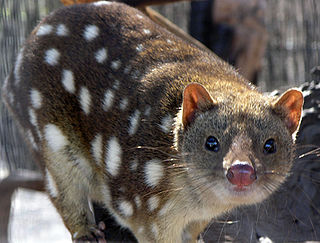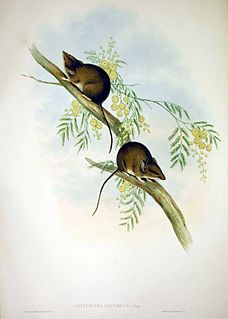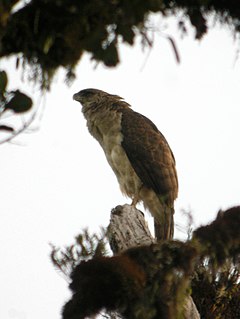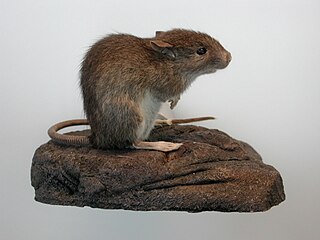
The Dasyuridae are a family of marsupials native to Australia and New Guinea, including 69 extant species divided into 21 genera. Many are small and mouse-like or shrew-like, giving some of them the name marsupial mice or marsupial shrews, but the group also includes the cat-sized quolls, as well as the Tasmanian devil. They are found in a wide range of habitats, including grassland, underground, forests, and mountains, and some species are arboreal or semiaquatic. The Dasyuridae are often called the 'marsupial carnivores', as most members of the family are insectivores.

The long-tailed planigale, also known as Ingram's planigale or the northern planigale, is the smallest of all marsupials, and one of the smallest of all mammals. It is rarely seen but is a quite common inhabitant of the blacksoil plains, clay-soiled woodlands, and seasonally flooded grasslands of Australia's Top End.
The former subfamily Planigalinae contained the planigales and the ningauis: very small marsupial carnivores native to Australia which are, like the quolls, antechinuses, dibblers, Tasmanian devil, and many others, part of the biological order Dasyuromorphia: the carnivorous marsupials. The subfamily is now contained in the Sminthopsinae subfamily, and the two genera are split between two different tribes; the planigales are by themselves in their own tribe, while the ningaui are lumped with the dunnarts and the Kultarr.

The common planigale, also known as the pygmy planigale or the coastal planigale, is one of many small marsupial carnivores known as "marsupial mice" found in Australia. There they fill a similar niche to the insectivores of other parts of the world.

The subfamily Sminthopsinae includes several genera of small, carnivorous marsupials native to Australia: kultarrs, ningauis, dunnarts, and planigales.

The New Guinea crocodile is a small species of crocodile found on the island of New Guinea north of the mountain ridge that runs along the centre of the island. The population found south of the mountain ridge, formerly considered a genetically distinct population, is now considered a distinct species, Hall's New Guinea crocodile. In the past it included the Philippine crocodile, C. n. mindorensis, as a subspecies, but today they are regarded as separate species. The habitat of the New Guinea crocodile is mostly freshwater swamps and lakes. It is most active at night when it feeds on fish and a range of other small animals. A female crocodile lays a clutch of eggs in a nest composed of vegetation and she lies up nearby to guard the nest. There is some degree of parental care for newly hatched juveniles. This crocodile was over-hunted for its valuable skin in the mid 20th century, but conservation measures have since been put in place, it is reared in ranches and the International Union for Conservation of Nature (IUCN) lists it as being of "Least Concern".

The Papuan eagle is a large bird of prey. It is also known by several other names, including Papuan harpy eagle, New Guinea eagle, New Guinea harpy eagle, or kapul eagle, the latter name from the local name for a usually arboreal, marsupial that the eagle is known to regularly hunt. This is an endemic species to New Guinea, and it can occasionally be found throughout the island. This is a forest-dwelling species, usually occurring in mature rainforest. The Papuan eagle is a fairly little-known species for a large eagle; however, it is known to prey on a wide range of prey, probably by and large mammals and birds from small to quite large sizes. What little study has been conducted about their breeding habits suggests they nest in a large forest tree, perhaps every other year. The Papuan eagle is probably naturally scarce, but it is under the threat of habitat destruction by deforestation, as well as hunting. Due to its small and declining population, the species has been classified as vulnerable by the IUCN.

The paucident planigale, also known as Giles' planigale, is a very small species of carnivorous marsupial of the family Dasyuridae.

The narrow-nosed planigale is a species of very small marsupial carnivore of the family Dasyuridae.

The genus Planigale are small carnivorous marsupials found in Australia and New Guinea. It is the only genus in the tribe Planigalini of the subfamily Sminthopsinae. There are five species:
The Papuan spine-tailed swift, also known as the Papuan needletail, New Guinea spine-tailed swift or Papua spinetail, is a small, stocky swift with a short, rounded tail and very fast flight. Head and upperparts glossy blue-black, white or whitish belly and undertail coverts, dark underwing with pale central stripe. The small spines at the end of the tail are not visible in flight.

The New Guinean rat is a species of rodent in the family Muridae. It is found only in parts of central Papua New Guinea.

The Papuan logrunner or New Guinea logrunner is a species of bird in the family Orthonychidae. It was formerly considered conspecific with the Australian logrunner.

The yellow-bellied longbill or green-crowned longbill is a species of bird in the family Melanocharitidae. It is found in New Guinea. Its natural habitats are subtropical or tropical moist lowland forest and subtropical or tropical moist montane forest.

The Papuan white-eye, sometimes known as the New Guinea white-eye, is a species of bird in the family Zosteropidae. It is found in the Aru Islands and New Guinea. Its natural habitats are subtropical or tropical moist lowland forests and subtropical or tropical moist montane forests. The species was first classified in 1878, and has a conservation status of Least Concern.

The New Guinea snake-necked turtle is a species of turtle in the family Chelidae. The species is found almost exclusively within Western Province, Papua New Guinea.

The Western New Guinea stream turtle or New Guinea snapping turtle is a species of freshwater turtle in the Chelidae family. It is found in the Bird's Head Peninsula and the Bomberai Peninsula west of Cenderawasih Bay, and on the island of Waigeo of West Papua, Indonesia.
Papurana novaeguineae is a species of true frog, family Ranidae. It is endemic to southern New Guinea and occurs between Lake Yamur and Purari River. Common name New Guinea frog has been coined for it.

Elseya schultzei, commonly known as Schultze's snapping turtle, is a species of chelid turtle endemic to northern New Guinea.

The New Guinea snake-eyed skink is a species of lizard in the family Scincidae. It is endemic to Indonesia and Papua New Guinea.

















